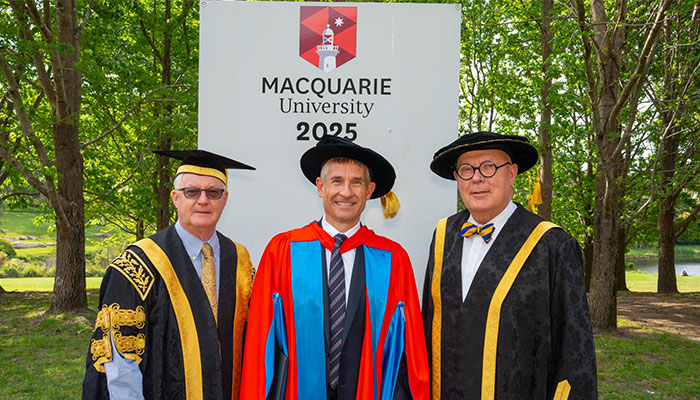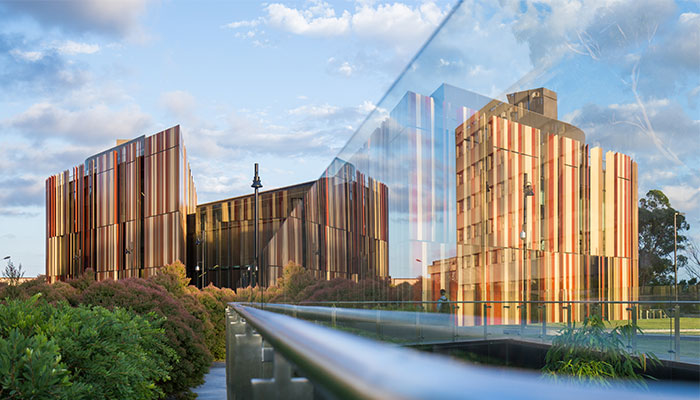The Australian Academy of Science has announced the 2014 winners of some of Australia’s most prestigious science awards, including three of Macquarie’s outstanding researchers; Dr Yingjie Yang, Dr Ian Wright and Dr Melanie Bishop.
Dr Yingjie Yang, an early career researcher in the Department of Earth and Planetary Sciences received the Anton Hales Medal.
Yang is responsible for a major breakthrough in the treatment and interpretation of seismic data, which has opened up the use of ambient noise signals to decipher structures in the Earth’s crust and upper mantle. Up to now, earthquakes or explosions had been necessary to generate seismic data, whereas with Dr Yang’s method the background creaks and groans of the Earth can be used to make images of the internal structure of the Earth.
Dr Ian Wright, a mid career researcher in the Department of Biological Sciences, received the Fenner Medal.
Wright is a plant ecologist whose work positions him at the intersection of trait ecology, ecophysiology and vegetation modelling. He has gained international recognition especially for investigating leaf function in relation to soil nutrients and climate, for the “leaf economic spectrum”, and for networking to translate knowledge to global scale. The leaf economic spectrum describes variation across plant species from those with cheaply-constructed leaves, rapid return on investment and short leaf lifespan to those with expensive construction, slow rates of return and long leaf lifespans. These broad leaf differences across species have also been shown to have “afterlife” consequences for decomposition and ecosystem processes.
Wright’s current work targets sapwood respiration and its implications for growth trajectories, and molecular-genetic traits. Through deep knowledge of botany, quantitative sophistication and diplomatic skills he has become an international leader in plant trait ecology.
Dr Melanie Bishop of the Department of Biological Sciences was also part of a group receiving the Thomas Davies Research Fund for Marine, Soil and Plant Biology, to develop indicators of seagrass carbon storage.
The Academy President, Professor Andrew Holmes congratulated all the award winners and grant recipients.
“This year’s award winners represent an incredible list of Australia’s scientific achievements, across a huge range of areas, from medicine to maths and engineering.” he said.
“It’s also fantastic to see three new awards being announced in honour of scientists who have made great contributions to our scientific knowledge.”
Dr Yingjie Yang, an early career researcher in the Department of Earth and Planetary Sciences received the Anton Hales Medal.
Yang is responsible for a major breakthrough in the treatment and interpretation of seismic data, which has opened up the use of ambient noise signals to decipher structures in the Earth’s crust and upper mantle. Up to now, earthquakes or explosions had been necessary to generate seismic data, whereas with Dr Yang’s method the background creaks and groans of the Earth can be used to make images of the internal structure of the Earth.
Dr Ian Wright, a mid career researcher in the Department of Biological Sciences, received the Fenner Medal.
Wright is a plant ecologist whose work positions him at the intersection of trait ecology, ecophysiology and vegetation modelling. He has gained international recognition especially for investigating leaf function in relation to soil nutrients and climate, for the “leaf economic spectrum”, and for networking to translate knowledge to global scale. The leaf economic spectrum describes variation across plant species from those with cheaply-constructed leaves, rapid return on investment and short leaf lifespan to those with expensive construction, slow rates of return and long leaf lifespans. These broad leaf differences across species have also been shown to have “afterlife” consequences for decomposition and ecosystem processes.
Wright’s current work targets sapwood respiration and its implications for growth trajectories, and molecular-genetic traits. Through deep knowledge of botany, quantitative sophistication and diplomatic skills he has become an international leader in plant trait ecology.
Dr Melanie Bishop of the Department of Biological Sciences was also part of a group receiving the Thomas Davies Research Fund for Marine, Soil and Plant Biology, to develop indicators of seagrass carbon storage.
The Academy President, Professor Andrew Holmes congratulated all the award winners and grant recipients.
“This year’s award winners represent an incredible list of Australia’s scientific achievements, across a huge range of areas, from medicine to maths and engineering.” he said.
“It’s also fantastic to see three new awards being announced in honour of scientists who have made great contributions to our scientific knowledge.”



